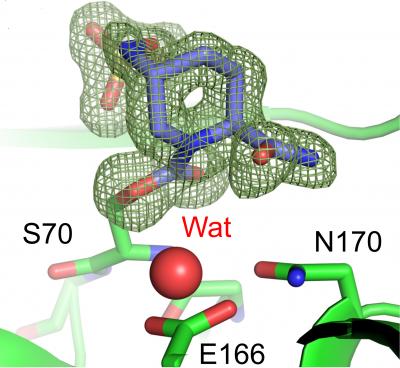Key discoveries offer significant hope of reversing antibiotic resistance

This is a molecular micro graphical abstract. Credit: Calvopina et al 2017
In the first paper, University of Bristol researchers defined the relative importance of two mechanisms associated with β-lactam antibiotic resistance. In one, bacteria restrict the entry of antibiotics into the cell; in the other, bacteria produce an enzyme (a β-lactamase), which destroys any antibiotic that gets into the cell.
The latter was found to be the more important of the two mechanisms. These findings imply that if chemicals could be developed to inhibit β-lactamase enzymes, a significant proportion of antibiotic resistance could successfully be reversed.
Building on these findings, and working in partnership with chemists at the University of Oxford and the University of Leeds, in the second paper, Bristol researchers studied the effectiveness of two types of β-lactamase enzyme inhibitor in a bacterium known to be highly resistant to common antibiotics.*
Using a variety of approaches, the authors studied avibactam, an inhibitor that has recently been introduced into clinical practice, and a “bicyclic boronate” inhibitor, which was first reported by the Oxford/Leeds/Bristol team in 2016.
They found both inhibitors failed to consistently protect the β-lactam antibiotic, ceftazidime, from attack by the β-lactamase enzyme. However, when paired with a different β-lactam antibiotic =, aztreonam, the inhibitors worked extremely well and killed some of the most resistant bacteria ever seen in the clinic.**
Dr Matthew Avison, Reader in Molecular Bacteriology from the University of Bristol's School of Cellular & Molecular Medicine, and senior author for both studies said:
“Our bacteriology research has further demonstrated that β-lactamases are the real “Achilles heel” of antibiotic resistance in bacteria that kill thousands of people in the UK every year.
“Structural/mechanistic work on β-lactamase enzymes, including that led by my colleague Dr Jim Spencer, is helping to drive the discovery of wave after wave of β-lactamase inhibitors, including the potentially game-changing bicyclic boronate class, shown to be effective in our research, and recently successful in phase one clinical trials.
“Two β-lactamase inhibitors have recently been licenced for clinical use: avibactam and vaborbactam. Our work shows that avibactam might more successfully be deployed with aztreonam instead of ceftazidime as its antibiotic partner. We are delighted to see that this combination has entered clinical trials, and has recently saved the life of a patient in the USA who was suffering from a previously untreatable infection.”
“This is an exciting time for researchers studying β-lactamase inhibitors. At the risk of sounding like King Canute, it is the first time for a decade that there is some genuine positivity about our ability to turn back the rising tide of β-lactam antibiotic resistance.”
###
Notes for Editors.
*The World Health Organisation recently placed cephalosporin and carbapenem resistant Gram-negative bacteria of the Enterobacteriaceae and Non-Fermenter groups at the top of its Priority List of Pathogens where Research and Development of novel treatment strategies is needed. The first paper investigated cephalosporin and carbapenem resistance in Klebsiella pneumoniae, one of the most clinically important members of the Enterobacteriaceae group.
**In the second paper, researchers studied the abilities of two β-lactamase inhibitors to reverse cephalosporin and carbapenem resistance in a member of the Non-Fermenter group, Stenotrophomonas maltophilia. This bacterium causes severe infections in immunocompromised patients and is usually resistant to all β-lactam antibiotics because it produces two β-lactamase enzymes.
The papers discussed are:
Paper 1:
Jiménez-Castellanos JC, Wan Nur Ismah WAK, Takebayashi, Y, Findlay, J., Schneiders T, Heesom KJ, Avison MB. Envelope proteome changes driven by RamA overproduction in Klebsiella pneumoniae that enhance acquired β-lactam resistance. Journal of Antimicrobial Chemotherapy 2017 doi10.1093/jac/dkx345. [Epub ahead of print]
Paper 2:
Calvopiña K, Hinchliffe P, Brem J, Heesom KJ, Johnson S, Cain R, Lohans CT, Fishwick CWG, Schofield CJ, Spencer J, Avison MB. Structural/mechanistic insights into the efficacy of nonclassical β-lactamase inhibitors against extensively drug resistant Stenotrophomonas maltophilia clinical isolates. Molecular Microbiology 2017 doi: 10.1111/mmi.13831. [Epub ahead of print].
Media Contact
All latest news from the category: Life Sciences and Chemistry
Articles and reports from the Life Sciences and chemistry area deal with applied and basic research into modern biology, chemistry and human medicine.
Valuable information can be found on a range of life sciences fields including bacteriology, biochemistry, bionics, bioinformatics, biophysics, biotechnology, genetics, geobotany, human biology, marine biology, microbiology, molecular biology, cellular biology, zoology, bioinorganic chemistry, microchemistry and environmental chemistry.
Newest articles

Silicon Carbide Innovation Alliance to drive industrial-scale semiconductor work
Known for its ability to withstand extreme environments and high voltages, silicon carbide (SiC) is a semiconducting material made up of silicon and carbon atoms arranged into crystals that is…

New SPECT/CT technique shows impressive biomarker identification
…offers increased access for prostate cancer patients. A novel SPECT/CT acquisition method can accurately detect radiopharmaceutical biodistribution in a convenient manner for prostate cancer patients, opening the door for more…

How 3D printers can give robots a soft touch
Soft skin coverings and touch sensors have emerged as a promising feature for robots that are both safer and more intuitive for human interaction, but they are expensive and difficult…





















